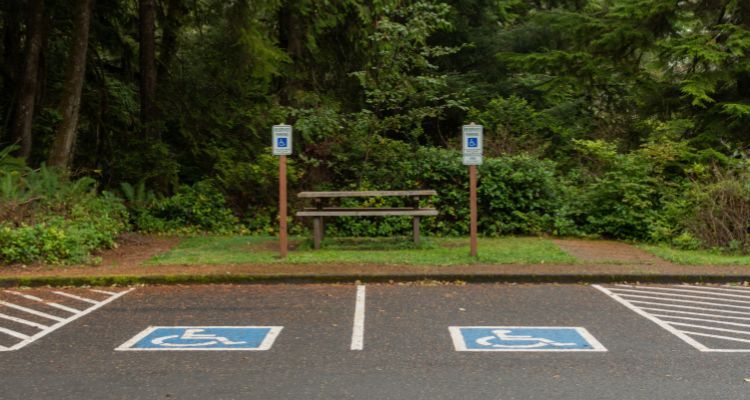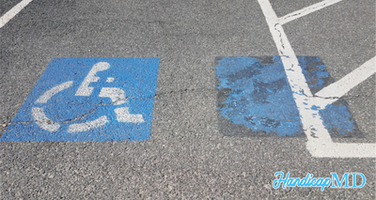
How to Replace a Lost or Stolen Handicap Placard in Iowa
Disability tags (also called disability placards or permits) are essential resources for individuals with disabilities, allowing them to park in designated accessible spaces that offer convenience and proximity to entrances. These tags provide vital support to people with mobility issues, making daily tasks easier and enabling greater independence. However, losing a disability tag or experiencing theft can be distressing, especially when it limits access to accessible parking.
If your disability tag has been lost or stolen in IA, don’t worry—replacing it is a straightforward process. This article will guide you through the steps to replace a lost or stolen handicap placard in Iowa, including what documents are needed, where to apply, and how to avoid common mistakes. We’ll also address frequently asked questions (FAQs) to help clarify details about IA's disability tag regulations.
Understanding Handicap Placards in Iowa
Purpose and Importance
Disability tags are issued to individuals who have mobility impairments or other qualifying conditions that limit their ability to walk or require the use of assistive devices. These tags are regulated by the Iowa Department of Transportation (DOT) and allow holders to access designated accessible parking spaces near entrances to buildings, shopping centers, medical offices, and other public places. The tags play a vital role in ensuring individuals with disabilities can maintain independence and participate fully in everyday activities.
Types of Disability Tags in IA
IA issues two types of handicap permits:
Permanent Disability Tag: For individuals with long-term or permanent disabilities that are unlikely to improve. This tag is valid for up to five years and must be renewed upon expiration.
Temporary Disability Tag: For individuals with short-term or temporary disabilities, such as those recovering from surgery or injury. This tag is valid for up to six months and may be renewed if the disability persists beyond the initial period.
Both types of tags come with similar parking privileges, allowing holders to park in accessible spaces. If your tag is lost or stolen, following the proper procedures for replacement is essential to continue accessing these benefits.
Key Features of Disability Tags:
- They can be used in any vehicle in which the authorized holder is a driver or passenger.
- Proper display of the tag is essential. It should hang from the rearview mirror when the vehicle is parked and be removed when the vehicle is in motion.
Who is Eligible for a Disability Tag in Iowa?
To qualify for a handicap placard in Iowa, individuals must meet specific medical criteria, verified by a licensed healthcare professional. These criteria ensure that only those with genuine needs receive the tags, preventing misuse and reserving accessible handicap parking for those who require it most.
Common Eligibility Conditions:
- Inability to walk more than 200 feet without needing rest.
- Severe lung disease that limits mobility.
- Use of portable oxygen.
- Cardiac conditions classified as Class III or IV by the American Heart Association.
- Severe neurological or orthopedic conditions that significantly impair movement.
- Legal blindness or severe visual impairments.
Medical Certification: A licensed physician, physician assistant, advanced registered nurse practitioner, or chiropractor must certify the applicant's condition. The certification must confirm that the individual meets one or more of the eligibility requirements set by the state.
Application Process for Handicap Placards in Iowa
1. Obtain the Application Form: The Application for Persons with Disabilities Parking Permit (Form 411055) is available on the state DOT’s website or can be picked up at a local DOT office.
2. Fill Out the Application: Ensure that you complete all required fields, including personal details and the type of tag or plate you are applying for (temporary, permanent, or license plate).
3. Get Medical Certification: The medical portion of the form must be completed and signed by a licensed HandicapMD healthcare provider. This step is crucial for verifying your eligibility.
4. Submit the Application:
- In-person: Bring the completed form to your local state DOT office or county treasurer’s office.
- By mail: Send the form to:
- Office of Vehicle Services
Iowa Department of Transportation
P.O. Box 9278
Des Moines, IA 50306-9278
- Office of Vehicle Services
5. Pay Any Applicable Fees: While most tags are issued at no cost, license plates may have fees similar to standard vehicle registration charges.
6. Wait for Processing: Processing times may vary. Temporary tags can often be issued quickly, while permanent tags or license plates may take a few weeks.
How to Obtain a Permit Online with HandicapMD.com
HandicapMD.com offers a convenient telehealth service that simplifies the process of getting your disabled parking pass by allowing you to:
- Sign Up: Visit the HandicapMD.com website and fill out the necessary form to schedule a consultation.
- Consultation: A certified doctor will assess your medical records and determine whether you meet the eligibility criteria.
- Medical Certification: The doctor will complete the certification section of the Application for Persons with Disabilities Parking Permit (Form 411055).
- Submit Your Application: Once your form is completed, submit it to the state's DMV either in person or by mail.
Why Getting the Permit Online is Beneficial
- Convenience: With HandicapMD.com, you don’t need to visit a doctor’s office. You can complete the entire process from home.
- Expertise: HandicapMD doctors specialize in understanding ADA guidelines and determining eligibility for disabled parking passes, ensuring a smoother process.
- Efficiency: The service allows for quick evaluations, helping you get your disability pass faster than traditional method.
What Documents You Need for a Disabled Permit Replacement
When replacing a lost or stolen disability tag, having the correct documentation will speed up the process.
Identification and Proof of Eligibility
For identification purposes, your Iowa driver’s license or state-issued ID is required. The DOT needs this to verify your identity and eligibility.
Certification by a Medical Professional
If your disability tag is permanent and your disability status hasn’t changed, you likely won’t need new medical certification. However, if your tag is temporary, you may need an updated certification from a licensed healthcare provider (doctor, physician assistant, nurse practitioner, or chiropractor) verifying that your condition still qualifies for accessible parking.
Replacement Fees and Processing Times
Replacing a lost or stolen disability tag in IA is free, as the state does not charge fees for issuing or replacing disability tags. However, if you need a replacement disability license plate for a vehicle, there may be a nominal fee for the new plate.
The processing time for a replacement tag varies but is generally two to four weeks if submitted by mail. For faster processing, consider visiting a local DOT or county treasurer’s office, as some offices may issue the replacement tag immediately.
Steps to Replace a Lost or Stolen Handicap Placard in Iowa
If your handicap placard is lost or stolen, taking immediate action to replace it ensures continued access to accessible parking spaces. Here’s how to do it:
1. Report the Loss to the Authorities
- File a Report (Optional but Recommended): Although not required by the state DOT, reporting a stolen tag to the local police department is advisable to protect against potential misuse and fraudulent activity.
- Get a Copy of the Report: This can be helpful if there are any issues with the replacement process or if you need to prove that the tag was stolen.
2. Complete the Application for a Replacement
- Obtain the Application for Persons with Disabilities Parking Permit (Form 411055) from the state DOT’s website or your local DOT office.
- Clearly indicate on the form that the tag is being replaced due to loss or theft. If your tag was stolen and you filed a police report, attach a copy to the application.
3. Provide Identification and Proof of Eligibility
- Identification Requirements: Submit a copy of your state-issued ID or driver’s license for verification purposes.
- Medical Certification: For permanent tags, medical certification is typically not required for replacements if you already have one on file with the DOT. For temporary tags, a current medical certification may be needed.
4. Submit the Completed Form
- In-Person Submission: Visit your local state DOT office or county treasurer’s office to submit the application.
- Mail Submission: You can also mail the completed form to the state DOT’s Motor Vehicle Division:
- Iowa Department of Transportation
P.O. Box 9278
Des Moines, IA 50306-9278
- Iowa Department of Transportation
5. Pay Applicable Fees
- Replacing a lost or stolen disability tag in IA is generally free. However, it’s wise to check with your local DOT office in case there are specific county-level fees.
6. Await Processing and Receive Your Replacement
- Processing times can vary, but most applications are handled within a few weeks. The new tag will either be mailed to your address or made available for pickup at your local DOT office, depending on your method of application.
Important Considerations for Replacement
Proper Use and Display of the Tag:
- Ensure that the tag is properly displayed by hanging it from the rearview mirror when parked. Remove it when the vehicle is in motion to avoid obstructing your view.
Eligibility Verification:
- The DOT may cross-check your eligibility during the replacement process, especially if there are any discrepancies or concerns with your application.
Preventing Future Loss or Theft:
- Keep It Secure: When not in use, store the tag in a safe location within your vehicle or home.
- Label the Tag: Write your contact information on the back of the tag (if allowed) to increase the chances of its return if lost.
Penalties for Misuse:
- Remember that disability tags are for the exclusive use of the individual they were issued to. Misuse, such as lending it to someone without a qualifying condition, can result in fines, revocation of the tag, and potential legal action.
Tips for Preventing Future Loss or Theft of Your Disability Tag
While it’s impossible to completely eliminate the risk of losing a disability tag, the following tips can help reduce the chances:
1. Store the Tag Securely: When not in use, keep the tag in a safe, designated place, such as a glove compartment or a protective case.
2. Use Identifiable Labels: If permitted, label your tag with your contact details on the back. This could assist in its return if found.
3. Park Smart: Choose parking spaces in well-lit, monitored areas whenever possible to minimize the risk of theft.
4. Invest in a Placard Holder: Using a holder or cover can help prevent wear and tear, making the tag less likely to become damaged and illegible.
5. Be Vigilant: Regularly check that your tag is still in place before leaving your vehicle. If you notice signs of tampering, consider moving to a different parking spot or reporting suspicious activity.
Security Tips for Preventing Theft
- Hide the Tag When Parking in Non-Accessible Spaces: When not using the tag, keep it out of sight to avoid attracting attention.
- Use Anti-Theft Devices: Consider using a lockable tag holder, which secures the tag to your rearview mirror and makes it harder to steal.
- Avoid Leaving It in Plain Sight: If your tag isn’t needed, remove it from your vehicle and store it securely at home.
Why It’s Important to Act Quickly
Losing access to accessible parking can significantly affect daily life, especially for individuals who rely on it for essential activities. By acting quickly to replace a lost or stolen disability tag, you can minimize disruptions and continue to enjoy the mobility benefits that accessible parking provides.
Consequences of Delaying Replacement:
- Parking Restrictions: Without a valid disability tag, you may face difficulties finding suitable parking close to entrances.
- Fines and Citations: Using a parking space without a valid tag can result in tickets and fines.
- Inconvenience: Not having a tag can add unnecessary stress and hinder participation in daily activities or social events.
Rules and Penalties for Misuse of Disabled Permits in Iowa
Penalties for Improper Use:
- Fines for misuse of a disability tag can range from $100 to $300, depending on the severity of the violation.
- Repeated violations can lead to the suspension or revocation of the tag or license plate.
Examples of Misuse Include:
- Using the tag when the authorized individual is not present in the vehicle.
- Lending the tag to someone without a qualifying disability.
- Displaying an expired tag.
Reporting Misuse: If you suspect someone is misusing a disability tag, report it to local law enforcement or the state DOT. Proper use of these tags is essential for maintaining accessible parking for those who genuinely need it.
FAQs About Replacing a Lost or Stolen Disabled Permit in IA
1. Can someone else pick up my replacement tag on my behalf? Yes, but you may need to provide written authorization, along with a copy of your ID and the ID of the person picking up the tag. Confirm with your local DOT office to understand their specific policy.
2. Do I need a new medical certification to replace my permanent tag? No, for permanent tags, a new medical certification is not typically required as long as your current eligibility is on file with the DOT.
3. How long does it take to receive a replacement tag? Processing times can vary, but most replacements are processed within a few weeks. The timeframe depends on the volume of applications and your method of submission (in-person or by mail).
4. Is there a fee for replacing a lost or stolen disability tag? In most cases, replacing a lost or stolen tag is free. Check with your local state DOT office to confirm if there are any specific charges in your county.
5. Can I use my disability tag in other states? Yes, disability tags issued in IA are generally recognized in other states under reciprocity agreements. However, it’s always a good idea to check the specific parking regulations of the state you are visiting.
6. What should I do if my tag is found after I’ve received a replacement? If your lost or stolen tag is found after you’ve received a replacement, return the original to the Iowa DOT or your local county treasurer’s office to prevent confusion or misuse.
7. How long is a replacement disability tag valid in IA? Replacement tags retain the validity period of the original tag. For example, if your original permanent tag was set to expire in two years, your replacement will also be valid for that same period.
8. Can I apply for a replacement online? Currently, the state DOT does not offer an online application process for disability tag replacements. Applications must be submitted either by mail or in person at a local county treasurer’s office or the Office of Vehicle & Motor Carrier Services.
9. Are there penalties for misusing a replacement tag? Yes. Misusing a disability tag, whether a replacement or original, can result in fines, penalties, and revocation of parking privileges. Only the person to whom the tag is issued may use it, and misuse can lead to serious consequences under the state law.
Conclusion
Replacing a lost or stolen handicap placard in Iowa is a straightforward process if you know the steps and have the correct documentation. By taking prompt action, you can regain the convenience and accessibility that a disability tag provides, ensuring that you maintain your independence and mobility.
This guide should help clarify the process, from reporting the loss to receiving your new tag. By following these steps and understanding the associated regulations, you can seamlessly navigate the process and continue enjoying the benefits of accessible parking. Always remember to use your tag responsibly and comply with all state DOT regulations to maintain your parking privileges.
.png)






